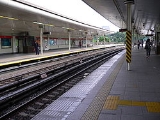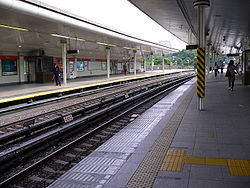
Yotsuya Station
Encyclopedia

Shinjuku, Tokyo
is one of the 23 special wards of Tokyo, Japan. It is a major commercial and administrative center, housing the busiest train station in the world and the Tokyo Metropolitan Government Building, the administration center for the government of Tokyo.As of 2008, the ward has an estimated population...
, Tokyo
Tokyo
, ; officially , is one of the 47 prefectures of Japan. Tokyo is the capital of Japan, the center of the Greater Tokyo Area, and the largest metropolitan area of Japan. It is the seat of the Japanese government and the Imperial Palace, and the home of the Japanese Imperial Family...
, Japan
Japan
Japan is an island nation in East Asia. Located in the Pacific Ocean, it lies to the east of the Sea of Japan, China, North Korea, South Korea and Russia, stretching from the Sea of Okhotsk in the north to the East China Sea and Taiwan in the south...
, located on the boundary between Shinjuku and Chiyoda
Chiyoda, Tokyo
is one of the 23 special wards in central Tokyo, Japan. In English, it is called Chiyoda ward. As of October 2007, the ward has an estimated population of 45,543 and a population density of 3,912 people per km², making it by far the least populated of the special wards...
, adjacent to Sophia University
Sophia University
There are several rankings below related to Sophia University.-General Rankings:The university was ranked 61st in 2010 in the ranking Truly Strong Universities by Toyo Keizai...
and the State Guest-House
State Guest-House
Akasaka Palace is a former imperial residence that functions today as the . The palace is designated by the government of Japan as official accommodation for visiting state dignitaries. Located in the Moto, Akasaka area of Tokyo, the building took on its present function in 1974, having previously...
, in the Yotsuya neighborhood.
History
Yotsuya opened in 1894 as a station on the Kobu Railway, the forerunner of the Chūō Line which was nationalized in 1906. Although the line was originally single-track, the segment passing through Yotsuya was double-tracked in 1895 and quadruple-tracked in 1929.The Marunouchi Line station opened in 1959, and the Namboku Line station opened in 1996. (Yotsuya was the southern terminus of the line until the opening of Tameike-Sannō Station
Tameike-Sanno Station
is a subway station in the Tokyo Metro network. It is located in the wards of Chiyoda and Minato .-History:The station opened on September 30, 1997 as the southern terminus of the Namboku Line...
in 1997.)
Lines
- Chūō Main LineChuo Main LineThe , commonly called the Chūō Line, is one of the major trunk railway lines in Japan. It runs between Tokyo and Nagoya, although it is the slowest direct railway connection between the two cities; the coastal Tōkaidō Main Line is slightly faster, while the Tōkaidō Shinkansen is the fastest rail...
(JR EastEast Japan Railway Companyis the largest passenger railway company in the world and one of the seven Japan Railways Group companies. The company name is officially abbreviated as JR East in English, and as in Japanese. The company's headquarters are in Yoyogi, Shibuya, Tokyo....
) - Chūō-Sōbu LineChuo-Sobu LineThe is a railway line located in Tokyo and Chiba Prefecture, Japan. Part of the East Japan Railway Company network, it runs on separate tracks along the right-of-way of the Chūō Main Line and Sōbu Main Line , providing service between Mitaka Station in the cities of Mitaka and Musashino and...
(JR East) - Tokyo Metro Marunouchi Line (Station number: M-12)
- Tokyo Metro Namboku LineTokyo Metro Namboku LineThe is a subway line owned and operated by Tokyo Metro in Tokyo, Japan. Its name literally means South-North Line. The line runs between Meguro in Shinagawa and Akabane-Iwabuchi in Kita...
(Station number: N-08)
All four lines at Yotsuya run north-south; however, the Chūō/Chūō-Sōbu Line and Marunouchi Line are mainly east-west lines, and somewhat counterintuitively, while northbound Chūō Line trains are bound for Tokyo and southbound trains are bound for Shinjuku, northbound Marunouchi Line trains are bound for Shinjuku and southbound trains are bound for Tokyo.
JR lines
The station has two island platforms with four tracks.Tokyo Metro Lines
The Marunouchi Line station is elevated with two side platforms serving two tracks. The Namboku Line station is underground with one island platform serving two tracks.Adjacent stations
|-!colspan=5|
|-
!colspan=5|

